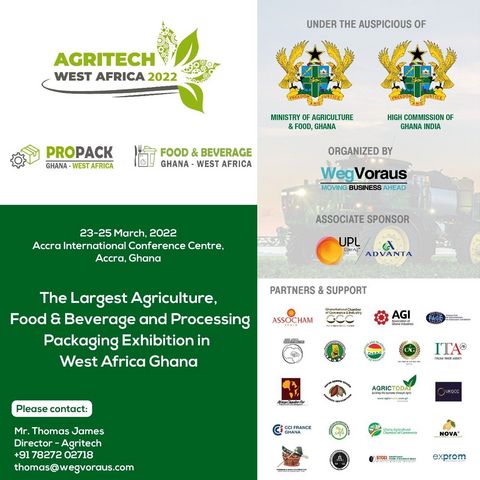
Conference & Seminar
AGRITECH WEST AFRICA 2022
Event ended.
Global agriculture technology suppliers meeting West African agro-business community in Ghana...

FOOD & BEVERAGE GHANA, is a collocated event with Agritech West Africa in Ghana, a platform for Food beverage and Processing Packaging industries & enterprises to meet the Ghanaian and West African business partners, manufacturers and value adding industries to meet, introduce and discuss new products and introduce their innovations and offers of partnerships.
The exhibition is organized under the Auspices of Ministry of Food & Agriculture, Ghana and with support of all major chambers and association in the Agribusiness in Ghana, namely Ghana National Chamber, Association of Ghana Business, Chamber of Agribusiness Ghana, Federation of Association of Ghanaian Exporters, Ghana-India Chamber, Farmers Organization Network of Ghana etc.
GHANAIAN FOOD & BEVERAGE MARKET
- In 2020, food imports for Ghana were USD 2.7Bn approx. accounting to 17.1% roughly of the total imports during the year, Though Ghana food imports fluctuated substantially in recent years, it tended to increase through 2000 - 2020 period.
- In Ghana, population growth is increasing, bringing with it, a sharp expansion of the country’s middle class. More than half (51%) of the population live in urban areas, a figure that is expected to increase by 3.1% per annum in the coming years.
- This new trend in economic and demographic shifts has had interesting influence on the dietary preferences of Ghanaian consumers - The preference for processed foods. Given time, demand and need for convenience, the growing middle-class consumers are prioritizing diversity, nutrition and safety in their food purchases, resulting in the increased demand for healthy ready-to-eat meals and processed products.
- Despite the growing demand from consumers, Ghana’s food processing sector remain largely underdeveloped. Although one would find a retail shop stocked with vast variety of processed foods, only a small percentage of the food consumed in Ghana are processed locally. The reality is that Ghana’s processing industry remains low in capacity, with a wide gap that is filled by imports.
- Although poultry produce is the most affordable source of protein in Ghana, the sector is faced by its own challenges and opportunities. Despite the rise in consumption of poultry meat, the growth in demand does not benefit local producers as there is a huge gap that is filled by imports.
- Rice is one of the major food staples consumed in Ghana, but the production is way behind its actual consumption requirements. In 2017 Ghana produced 721,610 tons of rice but consumption, at 1.3Mn tones, far outstripped it and left a deficit of 580,300 tones. In 2020 the rice demand in the country is estimated to be 1.5Mn tones.
- In Ghana, 70% of the domestic consumption represents fruit & vegetable market. Vegetable consumption in Ghana is still relatively small but is expanding rapidly. Most important vegetables are tomato, pepper (both sweet and hot chilies), onion, and okra and their market and production has boomed recently.
- Despite being agriculture-centric, Ghana is not able to cater to its own domestic demands and has to import large number of crops to satisfy its domestic needs. Cereal crops are the most imported commodity in Ghana, and among them, rice and wheat are the leading imports.
DOWNLOAD THE AGRITECH BROCHURE HERE
DOWNLOAD THE FOOD & BEVERAGE BROCHURE HERE
AGRITECH WEST AFRICA 2022
Event ended.